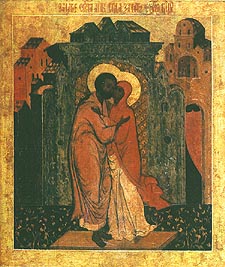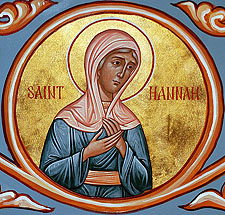|
|||
|---|---|---|---|
| This weekly bulletin insert complements the curriculum published by the Department of Christian Education of the Orthodox Church in America. This and many other Christian Education resources are available at http://dce.oca.org. | |||

The Orthodox Church celebrates "Righteous Saint Anna's Conception of the Mother of God." This lengthy, explicit title offers some important insights into Orthodox theology. First, it tells us that Mary the Mother of God was conceived through the union of two human parents, like any other person born in the world. Many icons of her conception clearly show her parents, Joachim and Anna, standing together in a loving embrace, with a bed behind or near them. The Western Church celebrates the feast day of the Immaculate Conception. This refers to the way Mary (not Jesus Christ) was conceived. The Roman Catholic teaching is that God intervened at the moment of Mary's conception to remove the stain of original sin, which is transmitted by the act of human reproduction. This stain marks us all from the day we are born. So, since God removed that stain from Mary, she is different from every other human being. Father Thomas Hopko, in his book "The Winter Pascha," writes that Orthodoxy does not go along with this teaching because our Church does not believe that such a stain exists. Father Thomas writes that all of us, including the Theotokos, "are born into a fallen, death-bound, demon-riddled world...We are all born mortal and tending toward sin. But we are not born guilty of any personal sin, certainly not one allegedly committed "'in Adam.'" The title of the Feast also tells us that the baby girl Anna conceived was indeed the one who would become the God-bearer, or Theotokos. God honors the act of human reproduction by using it to bring forth the woman who will have the most exalted privilege of any human being who ever lived. Not only that, but He leaves her free to say "no" to His plan for her if she so chooses. We honor Mary's agreement to God's plan because it is basic to our salvation. That she is born into the world the same way we are, with no special intervention by God, means that she can be a truly human example of holiness, one that we are able to follow. 
Another mother remembered by the Church is Hannah, the mother of Samuel. Like Anna, she had to wait a very long time to have a child. During those years of waiting, she was "broken-hearted and wept and did not eat" (I Samuel/I Kingdoms 1: 7). Joachim and Anna suffered too. Joachim was humiliated by being turned away from the Temple as he attempted to offer his sacrifice; being a childless man he was not considered worthy to do so. All three mothers suffered, especially the Theotokos who saw her Son unjustly crucified. But their joy later on would be great, and hers would be greatest of all. That is why the Church sings to her at Pascha: "Be radiant, O Pure Theotokos, in the Resurrection of Your Son!" |
|||
